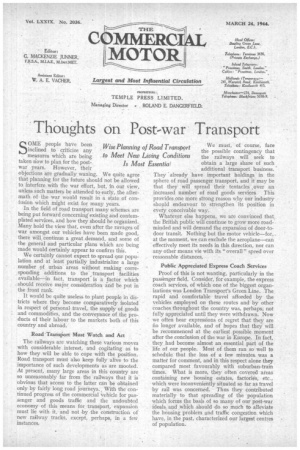' Thoughts on Post-war Transport S OME people have been inclined to
Page 15

If you've noticed an error in this article please click here to report it so we can fix it.
criticize any measures whidh are being taken now to plan for the postwar years. However, their objections are gradually waning. We quite agree that planning for the future should not be allowed to interfere with the war effort, but, in our view, unless such matters be attended to early, the aftermath of the war would result in a state of confusion which might exist for many years. In the field of road transport many schemes are being put forward concerning existing and contemplated services, and how they should be organized. Many hold the view that, even after the ravages of war amongst our vehicles have been made good, there will continue a great demand, and some of the general and particular plans which are being made would certainly appear to confirm this.
We certainly cannot expect to spread qur population and at least partially industrialize a large number of urban areas without making corresponding additions to the ;transport facilities available—in fact, transport is a factor which , should receive major consideration and be put in the front rank.
It would be quite useless to plant people in districts where they become comparatively isolated in respect of personal travel, the supply of goods and commodities, and the conveyance of the products of their labour to the markets both of this country and abroad.
Road 'TransPort Must Watch and Act " The railways are watching these various moves with considerable interest, and cogitating as to how they. .will be able to cope with the position. Road transport must also keep fully alive to the importance of such developments as are mooted. At present, many large areas in this country are so unreasonably far from the railways that it is obvious that access to the latter can be obtained only by fairly long road journeys. With the continued progress of the commercial Vehicle for pasSenger and goods traffic and the undoubted economy of this means for transport, expansion must lie with it, and not lay the construction of new railway tracks, except, perhaps, in a few instances. We must, of course, face the possible contingency that the railways will seek to obtain a large share of such additional transport business. They already have important holdings in the sphere of road passenger transport, and it may be that they will spread their tentacles _over an increased number of road goods services. This provides one more strong reason why our industry should endeavour to strengthen its position in eveiy conceivable way.
Whatever else happens, we are convinced that the British public will continue to grow more roadminded and will demand the expansion of door-todoor transit. Nothing but the motor vehicle—for,. at the moment, we can exclude the aeroplane—can effectively meet its needs in this direction, nor can any other means vie with its " overall " speed over reasonable distances.
Public Appreciated Express Coach Services Proof of this is not wanting, particularly in the passenger field. Consider, for example, the express coach services, of which one of the biggest organizations, was London Transport's Green Line. The rapid and comfortable travel afforded by the vehicles employed on these routes and by other coaches throughout the country was, perhaps, not fully appreciated until they were withdrawn. Now we often hear expressions of regret that they are no longer available, and of hopes that they' will be recommenced at the earliest possible moment after the conclusion of the war in Europe. In fact, they had become almost an essential part of the life of our people. Most of them ran so well to schedule that the loss of a few minutes was a matter for comment, and in this respect alone they compared most favourably with suburban-train times. What is more, they often covered areas containing new housing estates, factories, etc., which were inconveniently situated so far as travel by rail was concerned. Thus they contributed materially to that spreading of the population which forms the basis of so many of our post-war ideals and .which should do so much to alleviate the housing problem and traffic congestion which have, in the past, characterized our largest centres of population.




















































